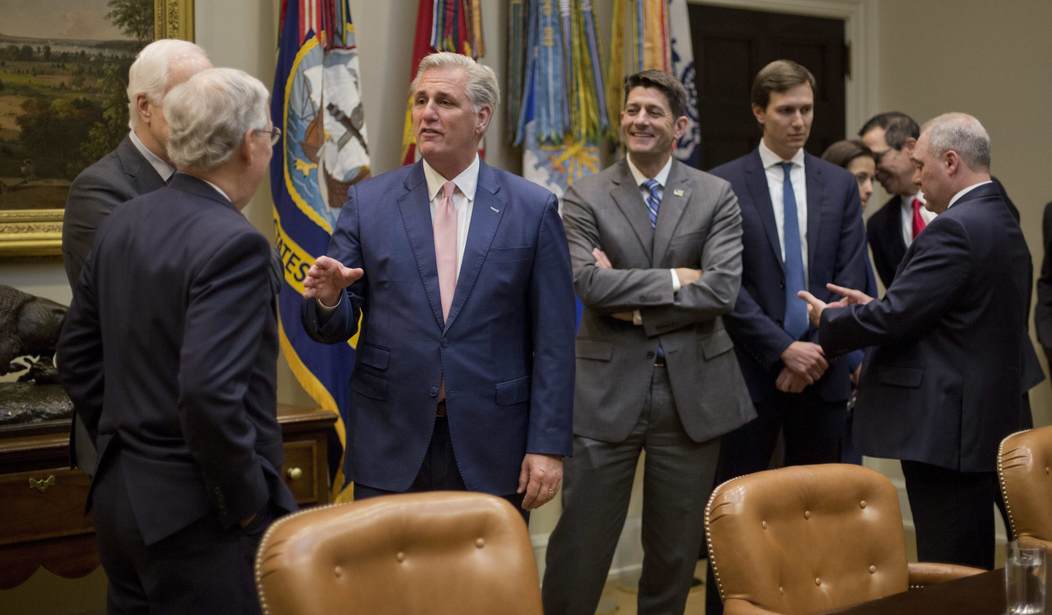WASHINGTON – Freshman Rep. Don Bacon (R-Neb.) has introduced legislation that would reduce congressional pay after fiscal years in which there was a federal budget deficit.
Similar legislation is introduced in every congressional session. The bills are considered feel-good proposals that have little chance of passing. Reps. Rob Wittman (R-Va.), David Loebsack (D-Iowa), Keith Rothfus (R-Pa.) and Vern Buchanan (R-Fla.) have all introduced similar proposals that would tie congressional pay to fiscal performance.
A Rasmussen Reports poll from February showed that 49 percent of Americans think that Congress is doing a “poor” job. While that’s far from a ringing endorsement, 25 percent of likely U.S. voters described Congress’ performance as “good” or “excellent.” That’s up 14 points from the 11 percent recorded last July, and that mark represents the “most confidence voters have shown in Congress since 2007,” according to the report.
Bacon’s legislation, the Accountability for Congressional Pay Act, would cut congressional pay “equal to the percentage of deficit spending in our federal budget,” up to 15 percent. The pay cut would be effective the following term, but first-term lawmakers would be exempt.
“For Fiscal Year 2016, our federal government spent $3.9 trillion while only bringing in $3.3 trillion in revenues,” Bacon said in a statement introducing the bill, which has garnered two co-sponsors. “As members of Congress, it is our duty not to spend more than we bring in and not increase our federal deficit, which is projected to skyrocket to $1.4 trillion by 2027. Every day, Americans are struggling to balance their own checkbooks and we must hold ourselves accountable and incentivize good budgetary practices.”
Co-sponsor Rep. Jack Bergman (R-Mich.) added that the country is on the cusp of a financial crisis, while urging lawmakers to stop “being irresponsible with people’s money.” Rep. Mike Gallagher (R-Wis.), who also signed onto the legislation, offered that the $19 trillion in national debt is bankrupting the U.S.
“My colleagues and I were elected to fix these problems rather than punt them down the road to be fixed at a later date,” Gallagher said.
Sean D. Foreman, a professor of political science at Barry University, said in a recent interview that while President Trump would gladly sign such a bill, its only chance of advancing is significant public support. He agreed that congressional pay is something the public does not scrutinize enough, given that the country is in crisis mode every half-year, moving from one fiscal cliff to the next and only addressing it with short-term budgets that further kick the can. The country is stuck in that cycle until a realistic solution is offered, he said.
Foreman said it’s a nice idea to cut congressional pay in hopes that it will improve performance, but he suggested balanced budget proposals as a better alternative. Every session, multiple balanced budget proposals are introduced. Such a proposal would require that Congress pass a balanced budget, preventing the U.S. from spending more than it takes in.
“I think they should focus on what they can do, and that is responsible budget proposals,” Foreman said.
House Speaker Paul Ryan (R-Wis.) said last week that Congress and Trump are unified on budget balancing objectives, while praising the president’s fiscal 2018 budget proposal.
“We finally have a president who’s even willing to balance the budget,” Ryan said. “The last president never proposed, let alone tried, to balance the budget. We have a president that’s actually giving us a balanced budget plan. It’s a plan to produce economic growth. Clearly Congress will take that budget, then work on our own budget.”









Join the conversation as a VIP Member